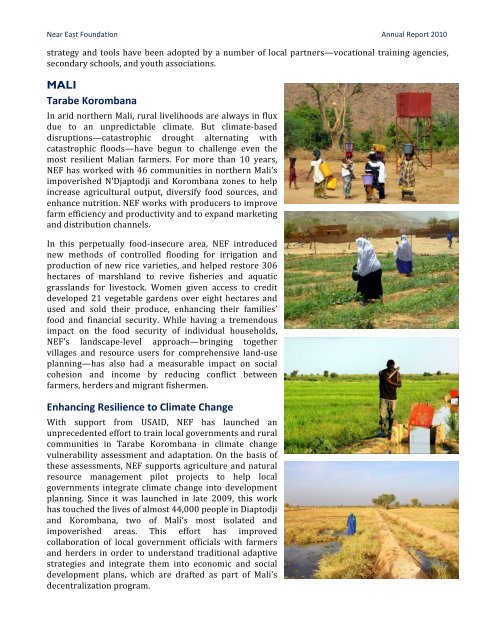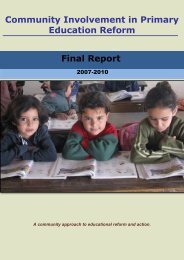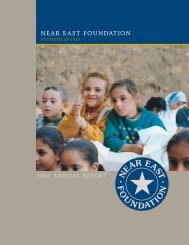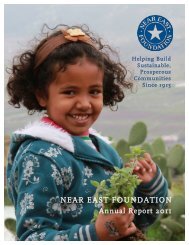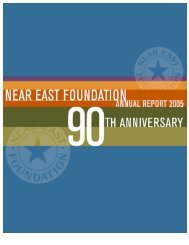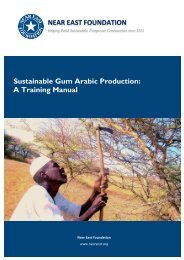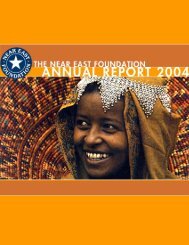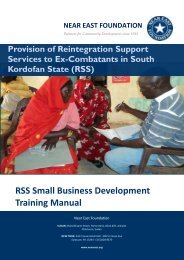NEF 2010 Annual Report - Near East Foundation
NEF 2010 Annual Report - Near East Foundation
NEF 2010 Annual Report - Near East Foundation
Create successful ePaper yourself
Turn your PDF publications into a flip-book with our unique Google optimized e-Paper software.
<strong>Near</strong> <strong>East</strong> <strong>Foundation</strong> <br />
<strong>Annual</strong> <strong>Report</strong> <strong>2010</strong> <br />
strategy and tools have been adopted by a number of local partners—vocational training agencies, <br />
secondary schools, and youth associations. <br />
MALI<br />
Tarabe Korombana <br />
In arid northern Mali, rural livelihoods are always in flux <br />
due to an unpredictable climate. But climate-‐based <br />
disruptions—catastrophic drought alternating with <br />
catastrophic floods—have begun to challenge even the <br />
most resilient Malian farmers. For more than 10 years, <br />
<strong>NEF</strong> has worked with 46 communities in northern Mali’s <br />
impoverished N’Djaptodji and Korombana zones to help <br />
increase agricultural output, diversify food sources, and <br />
enhance nutrition. <strong>NEF</strong> works with producers to improve <br />
farm efficiency and productivity and to expand marketing <br />
and distribution channels. <br />
In this perpetually food-‐insecure area, <strong>NEF</strong> introduced <br />
new methods of controlled flooding for irrigation and <br />
production of new rice varieties, and helped restore 306 <br />
hectares of marshland to revive fisheries and aquatic <br />
grasslands for livestock. Women given access to credit <br />
developed 21 vegetable gardens over eight hectares and <br />
used and sold their produce, enhancing their families’ <br />
food and financial security. While having a tremendous <br />
impact on the food security of individual households, <br />
<strong>NEF</strong>’s landscape-‐level approach—bringing together <br />
villages and resource users for comprehensive land-‐use <br />
planning—has also had a measurable impact on social <br />
cohesion and income by reducing conflict between <br />
farmers, herders and migrant fishermen. <br />
Enhancing Resilience to Climate Change <br />
With support from USAID, <strong>NEF</strong> has launched an <br />
unprecedented effort to train local governments and rural <br />
communities in Tarabe Korombana in climate change <br />
vulnerability assessment and adaptation. On the basis of <br />
these assessments, <strong>NEF</strong> supports agriculture and natural <br />
resource management pilot projects to help local <br />
governments integrate climate change into development <br />
planning. Since it was launched in late 2009, this work <br />
has touched the lives of almost 44,000 people in Diaptodji <br />
and Korombana, two of Mali’s most isolated and <br />
impoverished areas. This effort has improved <br />
collaboration of local government officials with farmers <br />
and herders in order to understand traditional adaptive <br />
strategies and integrate them into economic and social <br />
development plans, which are drafted as part of Mali’s <br />
decentralization program.


